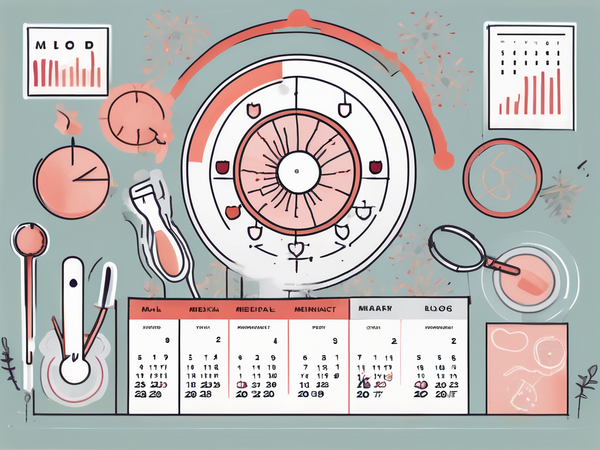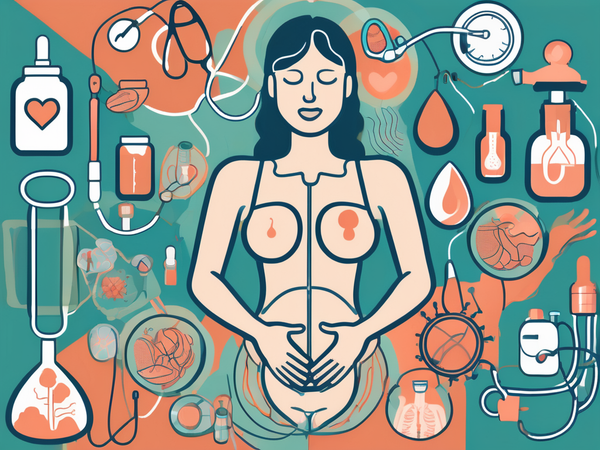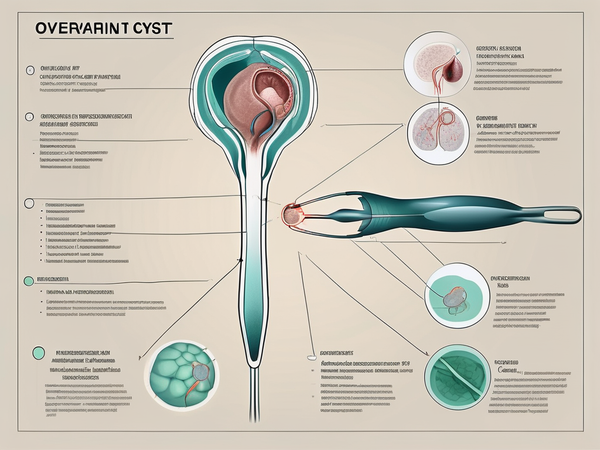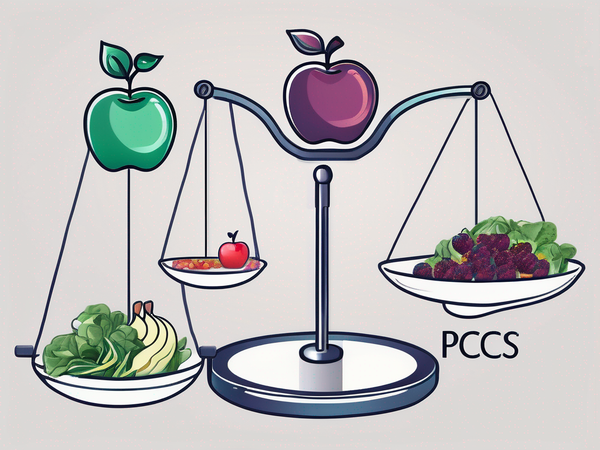Polycystic Ovary Syndrome (PCOS) and Polycystic Ovary Disease (PCOD) are two commonly misunderstood medical conditions that affect women. While both conditions share similarities, it is essential to understand the differences between them to ensure accurate diagnosis and appropriate treatment.
Understanding PCOS and PCOD
Defining PCOS: An Overview
PCOS, short for Polycystic Ovary Syndrome, is a common hormonal disorder that affects women of reproductive age. It is characterized by a combination of symptoms, including irregular periods, excess androgen levels, and the development of multiple small cysts on the ovaries. These cysts are not harmful but can lead to hormone imbalances.
Aside from the physical symptoms, PCOS can also have implications for long-term health, increasing the risk of conditions such as type 2 diabetes, high blood pressure, and heart disease. Managing PCOS involves a multifaceted approach that may include lifestyle changes, medication to regulate hormones, and fertility treatments for those trying to conceive.
Defining PCOD: An Overview
PCOD, or Polycystic Ovary Disease, is a condition characterized by the presence of multiple cysts on the ovaries. Unlike PCOS, PCOD does not necessarily involve the same hormonal imbalances or metabolic disturbances. Women with PCOD may experience irregular periods, fertility issues, and in some cases, mild symptoms of excess androgens.
It is important to note that while PCOD is less complex than PCOS in terms of associated hormonal and metabolic issues, it can still impact a woman's reproductive health and overall well-being. Treatment for PCOD may focus on managing symptoms such as irregular periods and addressing fertility concerns through medication or lifestyle changes.
Key Differences Between PCOS and PCOD
While PCOS and PCOD share the common feature of ovarian cysts, the key distinction lies in the additional hormonal and metabolic imbalances present in PCOS. PCOS is a more intricate condition that requires comprehensive management to address its wide-ranging effects on the body. On the other hand, PCOD, though less complex, still necessitates attention to symptoms and potential fertility issues to support a woman's health.
Unraveling the Causes of PCOS and PCOD
Polycystic ovary syndrome (PCOS) and polycystic ovary disorder (PCOD) are complex endocrine disorders that affect millions of women worldwide. While the exact causes of these conditions are still being researched, a combination of genetic, environmental, and hormonal factors is believed to contribute to their development.
Genetic Factors in PCOS and PCOD
Genetic predisposition plays a crucial role in the development of PCOS and PCOD. Studies have identified specific genetic variations that may increase the likelihood of developing these conditions. These variations can impact hormone regulation, insulin sensitivity, and ovarian function, all of which are key factors in the pathogenesis of PCOS and PCOD.
Lifestyle and Environmental Triggers
In addition to genetic factors, environmental influences and lifestyle choices can also influence the development of PCOS and PCOD. Factors such as obesity, lack of physical activity, unhealthy dietary habits, and exposure to endocrine-disrupting chemicals can all contribute to the manifestation of these conditions. Maintaining a healthy lifestyle and minimizing exposure to harmful environmental toxins may help reduce the risk of developing PCOS and PCOD.
Hormonal Imbalances and Their Role
Hormonal imbalances, particularly elevated levels of androgens such as testosterone, are a hallmark feature of PCOS. These imbalances can disrupt the delicate interplay of hormones involved in the menstrual cycle and ovarian function. The excess androgens can lead to symptoms such as hirsutism, acne, and irregular menstrual cycles. Understanding the role of hormonal imbalances in PCOS and PCOD is crucial for developing effective treatment strategies that target the underlying causes of these conditions.
The Diagnostic Process for PCOS and PCOD
Medical History and Physical Examination
Diagnosing PCOS and PCOD involves a comprehensive evaluation, starting with a thorough medical history and a physical examination. This helps the healthcare provider assess the presence of symptoms and rule out other conditions.
During the medical history assessment, the healthcare provider may inquire about the patient's menstrual cycles, weight fluctuations, acne, and hair growth patterns. These details can provide valuable insights into the potential presence of polycystic ovary syndrome (PCOS) or polycystic ovary disorder (PCOD).
Laboratory Tests and Imaging
Further diagnostic tests, including blood tests to measure hormone levels and imaging studies such as ultrasound, are commonly used to confirm the presence of ovarian cysts and hormonal imbalances.
When conducting blood tests, healthcare providers often look for elevated levels of androgens, insulin, and luteinizing hormone (LH), as well as abnormalities in follicle-stimulating hormone (FSH) levels. These hormonal imbalances can provide critical clues in differentiating between PCOS and PCOD.
Interpreting the Results
The interpretation of laboratory test results and imaging findings is crucial in distinguishing between PCOS and PCOD. Additionally, these results help guide the treatment approach and management strategies.
Imaging studies, such as transvaginal ultrasounds, can reveal the presence of multiple small follicles on the ovaries, a common characteristic of PCOS. These findings, combined with hormonal profiles from blood tests, aid in confirming the diagnosis and developing an individualized treatment plan for the patient.
Identifying the Common Symptoms of PCOS and PCOD
Physical Symptoms of PCOS and PCOD
Women with PCOS and PCOD may experience various physical symptoms, ranging from irregular menstrual cycles, excessive hair growth (hirsutism), acne, and even weight gain. These symptoms can vary in severity and can significantly impact a woman's wellbeing.
Moreover, the irregular menstrual cycles associated with PCOS and PCOD can lead to challenges in predicting ovulation, making it difficult for women trying to conceive. The excessive hair growth, known as hirsutism, can affect a woman's self-image and confidence, leading to emotional distress.
Emotional and Psychological Symptoms
It is essential to recognize that PCOS and PCOD are not just physical conditions but can also have emotional and psychological effects. Women may experience anxiety, depression, low self-esteem, and difficulties coping with the symptoms and their impact on daily life.
Furthermore, the hormonal imbalances characteristic of PCOS and PCOD can contribute to mood swings and irritability, affecting not only the individual but also their relationships with others. The struggle to manage these emotional symptoms alongside the physical manifestations of the conditions can create a significant burden on a woman's mental health.
Long-Term Health Implications
PCOS and PCOD are not just confined to reproductive health. There is a growing body of evidence linking these conditions to long-term health implications, including an increased risk of heart disease, type 2 diabetes, and endometrial cancer.
Research suggests that the insulin resistance often seen in women with PCOS can predispose them to developing type 2 diabetes later in life. Additionally, the hormonal imbalances and obesity commonly associated with these conditions can contribute to an elevated risk of cardiovascular issues, emphasizing the importance of proactive management and lifestyle modifications for women with PCOS and PCOD.
Effect of PCOS & PCOD on Fertility
The hormonal imbalances and irregular menstrual cycles associated with PCOS and PCOD can significantly impact a woman's fertility. The increased production of androgens can disrupt proper ovulation, leading to difficulties in conceiving. However, with proper management and lifestyle modifications, many women with PCOS and PCOD can achieve successful pregnancies.
Polycystic Ovary Syndrome (PCOS) and Polycystic Ovarian Disease (PCOD) are common endocrine disorders affecting women of reproductive age. PCOS is characterized by enlarged ovaries with small cysts on the outer edges, while PCOD is a condition where multiple small cysts form on the ovaries. Both conditions can lead to hormonal imbalances, including elevated levels of insulin and androgens, such as testosterone.
Furthermore, the irregular menstrual cycles experienced by women with PCOS and PCOD can make it challenging to predict ovulation, making it harder to conceive. This, coupled with the potential for insulin resistance, can further complicate fertility issues. It is essential for women with these conditions to work closely with healthcare providers specializing in reproductive endocrinology to develop personalized treatment plans to improve their chances of successful conception.
Remedies for PCOS & PCOD
While PCOS and PCOD cannot be cured, various treatment options are available to manage the symptoms and improve overall well-being. These treatment approaches may include lifestyle modifications, such as regular exercise and a healthy diet, hormonal therapies, and fertility treatments.
One of the key lifestyle modifications recommended for managing PCOS and PCOD is maintaining a healthy weight. Research has shown that even a modest weight loss of 5-10% can help regulate menstrual cycles and improve insulin sensitivity, which is often disrupted in individuals with these conditions. Incorporating a combination of aerobic exercises, such as brisk walking or swimming, and strength training can be beneficial in achieving and maintaining a healthy weight.
In addition to lifestyle changes, hormonal therapies are commonly used to address the hormonal imbalances associated with PCOS and PCOD. Birth control pills are often prescribed to regulate menstrual cycles and reduce the levels of androgens, such as testosterone, in the body. For individuals trying to conceive, medications like clomiphene citrate or letrozole may be recommended to stimulate ovulation.
Conclusion
In conclusion, PCOS and PCOD are complex conditions that require a comprehensive understanding of their causes, symptoms, and appropriate diagnostic approaches. Differentiating between these conditions is crucial for tailored treatment and management strategies. By working closely with healthcare providers and making proactive lifestyle changes, women with PCOS and PCOD can lead fulfilling lives and achieve their reproductive goals.

























